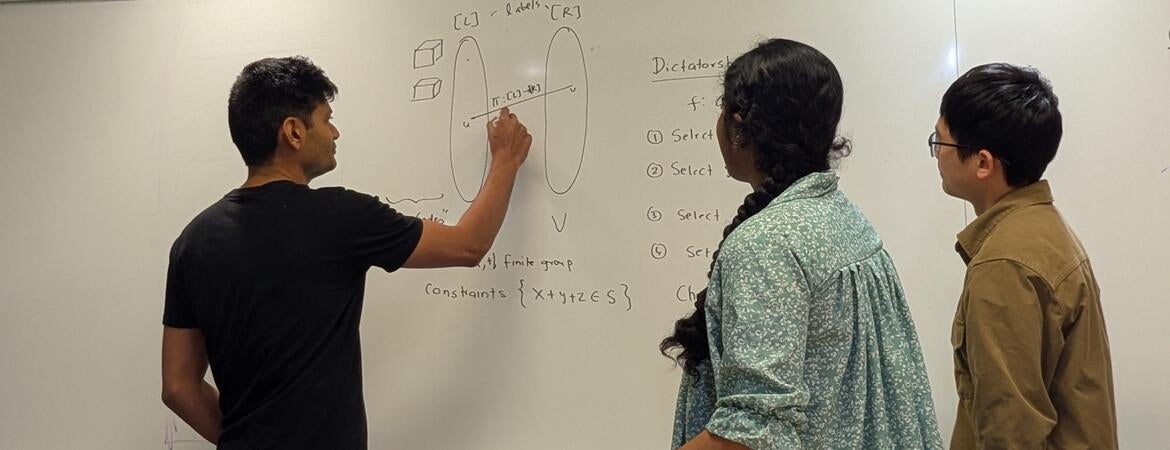
An interest in computer science first took root back when Amey Bhangale was in high school. As a junior and senior, he took courses in coding simple algorithms in the programming language C.
“In those early days of learning, the ability to write a program to solve specific problems intrigued me,” Bhangale said. “When I had to choose a discipline for my engineering course, it was the familiarity of programming vs. the unfamiliarity of other fields that attracted me towards computer science.”
He pursued computer science through college in India and graduate school at Rutgers University before developing a love of teaching that brought him to the Marlan and Rosemary Bourns College of Engineering in 2020. Bhangale currently is an assistant professor in the Department of Computer Science and Engineering.
His research and teaching interests contributed to a recent achievement: Bhangale was named a recipient of a National Science Foundation (NSF) CAREER award. This prestigious award supports early-career professionals who demonstrate the potential to serve as academic role models and advance their institution’s mission.
“It feels great to be recognized for your work and efforts, and this award was quite an encouragement for me,” Bhangale said.
The computer scientist was on the receiving end of encouragement when he was just starting as an undergraduate student at Veermata Jijabai Technological Institute in Mumbai, India. While there, Bhangale connected with a peer group that was “a huge source of learning” and enjoyed courses such as Data Structures and Theory of Computing. As a third- and fourth-year student, he was tutored in the basics of algorithms and complexity theory, which focuses on quantifying the resources needed to solve computational problems, by a very influential professor, Rajiv Gandhi.
“That was certainly an inflection point in my career, and it greatly influenced and shaped my interest in the field of algorithms,” Bhangale said.
He then worked a nearly year-long stint at top technology company Nvidia before he started working on a PhD in computer science at Rutgers University. Bhangale said he encountered faculty and a doctoral advisor, Swastik Kopparty, who helped deepen his understanding of the field and further develop his research interests. It was an experience he described as “one of the most fascinating and career-defining periods of my life.”
Bhangale gravitated to teaching in part because of his experiences as a teaching assistant and as a member of a research paper reading group at Rutgers.
“The experience of not just training myself but imparting that knowledge to many more students, and potentially serving as a seed of inspiration for at least one of them to pursue research, eventually led me to choose academia over other career paths,” he said.
As a BCOE faculty member, Bhangale said he works to ensure that the courses he teaches expose students to the latest developments and motivate them to hone their logical thinking and algorithm design skills.
“Students enjoy engaging with cutting-edge ideas and recent advancements, and I also grow alongside them — staying current and continuously learning as I teach,” he said.
Bhangale has also distinguished himself through research. He was named a 2023-2024 University of California Hellman Fellow, which allowed him to advance his research and mentor undergraduate students.
Bhangale was recently awarded an NSF CAREER award, which will support his research in an area involving what are called Constraint Satisfaction Problems (CSPs) with a $654,000 grant. CSPs are useful for modeling problems dealing with combinatorial optimization — which focuses on finding the best option among a range of possibilities that are far too big to check one at a time.
“Many important problems in the real world — like planning airline schedules, designing computer chips, managing traffic on networks, or detecting communities in social media — can be seen as optimization problems,” Bhangale said. “For these situations, we want to make the best possible choice from many possibilities.”
His NSF project will also connect with his love of teaching and include an educational component.
“It will partner with local high schools to help students see how exciting and essential math is in science and technology,” Bhangale said.
Header image: Department of Computer Science and Engineering assistant professor Amey Bhangale (first from left) with students. (Photo courtesy of Amey Bhangale)
